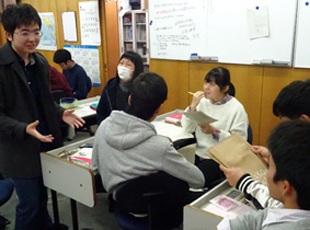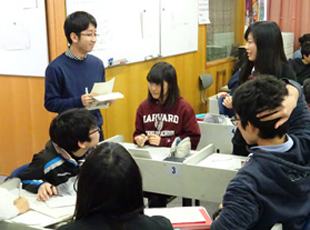Initiatives inside school
Global Economy
(1) Credit and school hours: 1 credit
(2) Target: First-year students
(3) Objectives
In world history class, we particularly emphasize units that are deeply associated with the integration of the world community and globalization. In parallel with such learning, we offer group studies to encourage students to examine issues deriving from globalization thereby enhancing their proactive awareness of associated challenges and problems. From time to time we offer lectures by relevant specialists as necessary.
① Aug. 26 (Sat.) Global Lecture Meeting: “The Current World Situation and Challenges Facing Japan” Lecture by Mr. Yoichi Ito, Principal Investigator, Sumitomo Mitsui Trust Research Institute
- Contents: Using “Division” and “Cold Dreams” as keywords, the lecture allowed the audience to learn about the background of the birth of the Trump Administration in the United States while explaining that similar division is in pregress worldwide. Despite that, the audience knew that improving our democracy little by little should be the only course for us to take, changes should be regarded as opportunities, and technology would transform the world. To deepen the students’ understanding of current affairs, this lecture took the form of a simulated news program in which the lecturer explains news topics chosen by sutdents beforehand.
② June 24 (Fri.): “To create a disaster-resistant community: Case study of the “Inu-no-Mansui” deluge to learn that a ‘tsunami’ can even hit a mountainous region” ? Lecture by Mr. Takayuki Aoki, Senior Director, Nagano Prefectural Museum of History
- Contents: Taking up the case of the “Inu-no-Mansui” flood that took place in Nagano Prefecture in the mid-18th century, Mr. Aoki’s lecture was instructive as an approach to clarify why natural disasters occur. Our students learned that, in addition to a historical approach based on ancient documents, multi-faceted approaches using knowledge and data from the social and natural sciences as well as case studies on today’s natural disasters are also required to properly conduct a study of this kind.
③ Oct. ~ Feb.: Lectures and seminars by teachers responsible for specific subjects
- Contents: Based on previous-semester studies from a world history perspective (up to the end of World War II), students learned via lectures and seminars about post-World War II world politics and the economy as well as about various problems facing the international community. To be specific, they studied the following: International Law; Collective Security and the United Nations; International Politics in the East-West Cold War Period; International Politics after the Cold War and Challenges Facing Contemporary Japan; Nuclear Weapon Problems; Human Rights and Ethnic Issues; Mechanism of World Economy; Globalization and the World Economy.
④ Dec. 9 (Sat.) Lecture by Prof. Masanori Naito, Doshisha University Graduate School
- Contents: “Collapse of Coexistence between Islam and Western Europe”
? Europeans’ conflicts with Muslims and attemps for coexistence
? What we should keep in mind when we interact vis-a-vis with people from different cultural backgrounds
5 English Project I
(1) Credit and school hours: 1 credit
(2) Target: First-year students
(3) Objectives
① Apr. ~ May Self-introduction (The basics of presentation)
② Jun., Jul. and Aug. Preparations for presentation
-
Students chose one from the following categories, based on which they set their respective topics.
- Informatin morals
- ICT skill training
1. Science & Technology
2. Cultural Similarities & Differences
3. Travel & Geography
4. Solutions to War, Hunger and Global Issues
5. Environmental Issues
③ Sep. 30 (Sat.) Self-Education Preparation in English (mid-term presentation meeting) Special task
- All first-year students are grouped and assigned to 14 classrooms (each with 20 or so students).
- Time for presentation per person is over 5 min. and up to 10 min.
- They receive evaluation by commentators from the outside.
- Commentators:
Shinshu University teachers (8)
Pauline N.Kawamoto;
Asano, David;
Hernan Aguirre;
Takuya Kawahara;
Akimi Fujita;
Rin Senrei;
Jason Andrews;
Wataru Takahashi
Seisen Jogakuin College (2)
Yoiichi Nakamura;
Yukiko Yabuta
Businesses (2)
Pratima Kumari Shah (?), Densan Co., Ltd.
May Hsu Shin, ACA Sekkei Co., Ltd.
Shinshu University undergraduate and graduate school students (12)
Wiktor Klonowski; Sora Otsuki; Ga Bop Hanh; MUHAMMAD ILYAS BIN ISMAIL; Kanaho Hanji; Sakura Takasu; Ashenafi Abadi Elyas; Kumho Lee; NIRJHOR MD SAMS AFIF; Quang Nguyen hong; BATAJOO, AMIT; Ernesto Rodriguez - Examples of topics set by students: Superstring Theory / Light Pollution / World Heritage in Peru / Table Manners / Ecosystem of the ASntarctic
④ Sep. ~ Jan. Academic Debate
-
Students learned the basics of debating in English.
Group research Competitive debating
6 English Project II
(1) Credit and school hours: 1 credit
(2) Target: Second-year students
(3) Course objectives
② To allow students to acquire the ability to properly communicate their intentions to others in English after gaining a perspective on various international issues and diverse values.
③ To encourage students to build a mutually enhancing relationship by encouraging cooperation with each other within a group and enhancing each other’s ideas and abilities.
④ To nurture students’ abilities for “working together” in this globalized world by making the most of the Information and Communication Technology (ICT) and by taking advantage of our friendly-exchange relationships with Taiwanese high schools.
① Apr. ~ May Communication Training
- Self-introduction
- ICT skill training
- My Favorite Presentation
② Jun. ~ Jul. Presentation on global issues
③ Jun. ~ Jul. Preparations for exchanges in Taiwan, Creation of presentation materials
- Creation of presentations to activate discussion
- Google-based exchange of comments with Taiwanese students
- Examples of students’ presentations
④ Dec. ~ mid-Jan. Parliamentary Debating
-
Model debating by senior studdents (via video tools made on their own)
(1) Nagano Senior High School students should wear school uniforms.
(2) SNS should be banned for children.
(3) Google (The Internet) makes people stupid.
⑤ Md-Jan. ~ Feb. Essay writing & Workshop
-
(A) Thesis statement and paragraph structure
(B) Thesis statement Organization
(C) Outline and preparation for writing an essay
(D) Writing and completing an essay


